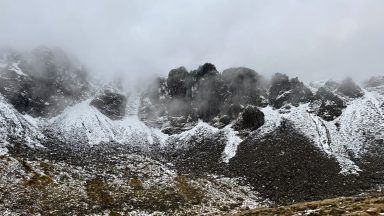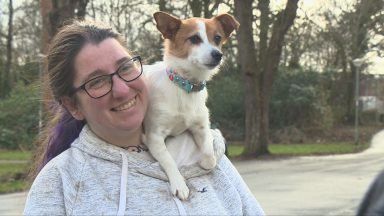Zibya Bashir lost her mother, Rafaqat Khalid, to coronavirus at the start of lockdown.
Ms Bashir said it feels like her mum, who was originally from Pakistan, had been “snatched away from her” following her sudden death.
It’s not known whether her mother was more likely to be affected by coronavirus because of her ethnicity – however studies have shown it’s possible.
Data in England and Wales suggests BAME people are disproportionately dying with coronavirus.
Some fear a lack of similar data in Scotland will lead to a lack of action on racial inequalities and there are now calls for more research.
Ms Bashir told STV News: “She was amazingly strong. She had seven kids, a husband to look after and 13 grandchildren. She was always there for all of us, nothing was ever too much.
“She had a liver transplant about seven years ago, and thankfully it was successful. But even after that she did everything for herself.
‘The Scottish Government needs to take it more seriously but each and every one of us has to talk, I don’t think we can afford to be complacent because the reality is people have died as a result of it and people still are.’
Zibya Atif
“She was just a very very strong woman, very strong.
“About seven or ten days before she passed away she was diagnosed with a chest infection.
“The doctors weren’t concerned about it being Covid, they just put it down as a minor infection and she was on antibiotics.
“She was eating fine and things and for a few days it was as if she was completely better but it was almost overnight she developed breathlessness and it just got worse and worse. An ambulance was called for her after they had spoken to the doctor on the phone.
“She was taken into hospital on a Wednesday night. The Thursday was a very difficult day for the family because we weren’t allowed to be with her.
“They did an X-ray and the hospital called to say only one person from the family could come in to be with her because they said the X-ray was typical of that of a Covid patient. And then on the Friday morning she was gone- just like that. It feels like she was snatched away from us.

“We didn’t get to do the normal things when someone passes away. There was no proper funeral. Islamic funerals are different from conventional non-Islamic funerals. It’s made it all the more hard because we haven’t been able to grieve together as a family.
“You wake up every morning and it’s the first thing in your head. There isn’t a day that goes by when I don’t cry thinking about how much I miss her.
“The Scottish Government needs to take it more seriously but each and every one of us has to talk, I don’t think we can afford to be complacent because the reality is people have died as a result of it and people still are.”
In England and Wales, the mortality rate for Covid-19 is higher for black and minority ethnic people than for white people.
However, it cannot conclusively be said that the situation is the same in Scotland.
A report from National Records of Scotland released in July showed coronavirus was a more common cause of death for South Asian people, compared to white people.
But there was insufficient data to determine how other ethnic minority groups in Scotland were affected.
The Scottish Government has acknowledged that there is a lack of data here, and has created a task force to investigate the issue.

The team, called the Expert Reference Group on Covid-19 and Ethnicity, has recommended recording ethnicity on NHS databases is made compulsory.
A study from Aberdeen University has highlighted the importance of recording this kind of data in shaping policy.
Professor Shaun Treweek said: “Within Covid studies, it’s often the case that not only is there no special attempt to make it easier for black, Asian and minority ethnic groups to take part but there’s no record of the ethnicity of any participants.
“We clearly need to have high proportions of individuals from across the spectrum of ethnic communities – often we don’t.
“Ok, there is a problem. Once having recognised that, we need to start working with our local communities, discovering why there are particular problems for particular ethnic groups, and seeing what we can do to make it easier, more likely and more possible for those individuals to get involved in our research.”
Campaigners say it’s not just the health of BAME communities that is suffering detrimental effects from the pandemic.
Usman Ali, chair of the STUC Black workers committee, said: “We have been engaging with the Scottish Government on multiple areas of policy, predominantly to improve data collection recording and reporting so that we know who exactly is being impacted and how.

“We’ve also been making sure that underrepresented groups within black and ethnic minority communities such as those seeking refuge and asylum are being well looked after and cared for.
“We’re making sure that those working in the health and social care sector are being well looked after and have risk assessments at work.
“This pandemic has demonstrated the inequalities that black and minority ethnic workers and communities were facing long before the pandemic and therefore when plans have kicked in it can appear the response that the Government may have has been slow.
‘This pandemic has demonstrated the inequalities that black and minority ethnic workers and communities were facing long before the pandemic.’
Usman Ali, chair of the STUC Black workers committee
“But when we have challenged the Scottish Government, and we have challenged them multiple times quite publicly, the Scottish Government have responded.
“Coronavirus is predominantly a health pandemic but it’s also a socio-economic crisis, and sadly BAME communities are facing the brunt on all those fronts.”
Work is being done in Scotland to combat the barriers people from ethnic minorities face.
This includes translating Government and NHS guidance for people who’s first language isn’t English.
A Scottish Government spokesperson said: “The Expert Reference Group on Covid-19 and Ethnicity was formed in June, in response to UK-wide and international reports that Covid-19 was disproportionately impacting on some minority ethnic groups.
“The group has already played a vital role in informing the Scottish Government response to Covid-19 and has now submitted its initial advice and recommendation, some of which have already been reflected in our programme for government.
“In recognition of the group’s concern over a lack of high quality population-based data we will make ethnicity a mandatory field for health databases, develop a link to the census, and embed the process of ethnicity data collection in the culture of the NHS in Scotland.
“We will also look to increase the numbers of minority ethnic staff in senior executive team roles in health and social care, while ensuring staff at all levels have a voice and influence to help drive change.
“We will also look closely at undertaking a review of our past and current initiatives to tackle systemic racism.
“The group’s recommendations require careful consideration, and a full Scottish Government response will be given in due course.”
Follow STV News on WhatsApp
Scan the QR code on your mobile device for all the latest news from around the country



























